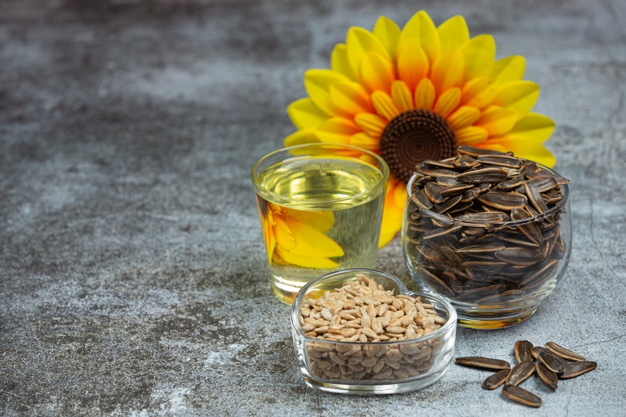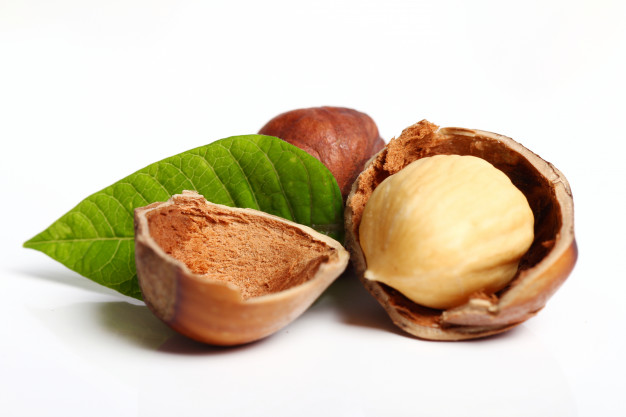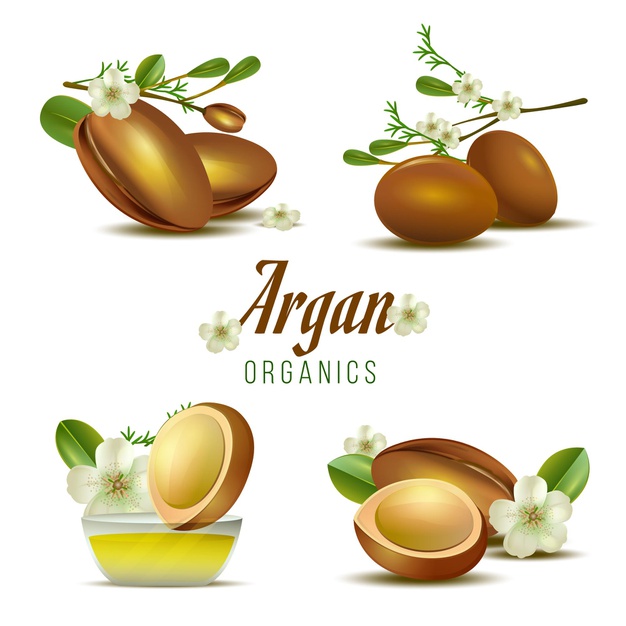The non volatile oil, which is extracted from sunflower seed, is known as sunflower seed oil. It is considered as a healthy vegetable oil and extensively used for several therapeutic purposes.
Characteristics
- In room temperature it is liquid in nature
- It is slight amber in colour
- It has a fatty odour
Type of sunflower seed oil
On the basis of linoleic acid content, sunflower seed oil is classified into 4 classes, which include –
- High linoleic: This type of sunflower seed oil contains about 69% of linoleic acid
- High oleic: This type of sunflower seed oil contains 82% of oleic acid
- Mild oleic: This type of sunflower seed oil contains 65% of oleic acid
- High oleic with high stearic: this type of sunflower seed oil contains 72% of oleic acid as well as 18% of stearic acid
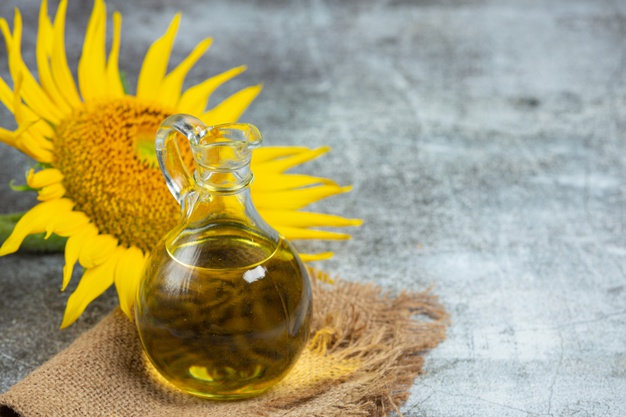
Method of oil extraction
Various methods are utilized for extracting oil from sun flower seed, such as –
- Expeller pressing method that involves crushing of sunflower seed and squeeze the oil directly from the seed
- Cold pressing method, which involves the expeller pressing method under very low temperature
- Oil can also be extracted by using solvents like hexane and this method is known as solvent extraction method

Nutritional profile
- It is packed with unsaturated fatty acids and contains both PUFA and MUFA. It also contains saturated fatty acids but does not contain any transfat or cholesterol. It is generally rich in linoleic acid, oleic acid, stearic acid and palmitic acid
- It is rich in various micronutrients that play several important biochemical functions of body, these nutrients include Vitamin A, Vitamin K, Vitamin E, folic acid, selenium, magnesium, zinc, phosphorus and potassium
Health benefits
Role on immunity
- Linoleic acid of sunflower seed oil plays significant role in improving immunological responses of the body
- Essential fatty acid components of sunflower seed oil help to maintain proper functioning of B cells as well as T cells and also improve B cell and T cell mediated responses
- It is also associated with synthesizing new cells and tissues in body, which are extremely beneficial for boosting up the overall immunity
Role on digestive health
- Its polyunsaturated fatty acid contents play imperative role in improving digestion thus its consumption is very helpful for preventing various digestive issues
- It also exerts potent laxative effect, which is associated with improving bowel movement and it also helps to make the stool soft and loose thus helps to improve the symptoms of constipation

Role on improving energy
- Unsaturated fatty acid content of sunflower seed oil is responsible for energize an individual
- It helps to promote cellular respiration thus helps to boosting up the energy level within body
- It has also seen that it is closely related with discharging glycogen from hepatic cell into blood stream where glycogen acts as an effective energy booster
Role on oral health
- It plays vital role in improving oral health
- Sunflower seed oil exerts potent antimicrobial activity, which helps to destroy microbes and reduces their harmful consequences. It has seen that the oil is very effective against C. albicans and thus helps to decrease the prevalence of oral infections
- It is also very effective for oil pulling that helps to reduce the prevalence of microbial infestation and also improves oral hygiene
- It is associated with preventing dental plaque formation as well
- It also helps to prevent gingivitis and other gum related disorders
Role on regulating cholesterol level
- It plays significant role in reducing cholesterol concentration in blood
- Sunflower seed oil contains phytosterol, which is associated with reducing blood cholesterol level by countering the absorption of cholesterol in blood stream
- Its unsaturated fatty acid contents are accountable for reducing the blood concentration of LDL, VLDL and triglyceride and also help to improve blood HDL level, which ultimately help to maintain a healthy lipid profile

Role on skin
- It helps to promote skin health by enhancing skin barrier functions
- It also helps to moisturize the skin
- It plays significant role in hydrating the skin
- It helps to protect the skin from the harmful effects of UV radiation
- It also helps to prevent acne, eczema, blemishes and wrinkles
Role on hair
- Its Vitamin E content plays significant role in improving hair health
- It also helps to prevent hair loss and baldness
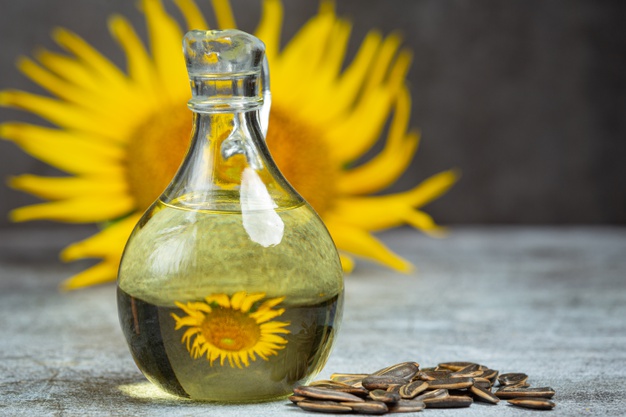
Medicinal uses
Role on preventing cardiovascular diseases
- As it is rich in unsaturated fatty acids and low in saturated fatty acids thus it is well utilized as an effective preventive measure for cardiac diseases
- Its hypolipidemic activity is responsible for decreasing body fat percentage especially cholesterol concentration thus decreases the prevalence of atherosclerosis
- It also helps to lessen the risk of developing coronary artery disease, heart attack and stroke
- It helps to prevent hypertension as well
Role on preventing chronic inflammatory diseases

- It is extensively used for preventing anti-inflammatory diseases as it is related with reducing the concentration of inflammatory mediators in body thus delays the onset of inflammatory events
- Linoleic acid component of sunflower seed oil is considered as the main component that prevents inflammation
- It is very effective for improving the symptoms of arthritis especially rheumatoid arthritis as it helps to prevent joint swelling
- It also helps to reduce arthritic pain
Role on reducing the prevalence of cancers
- Its micronutrient content, unsaturated fatty acid content and antioxidant content are responsible for inhibiting cancerous cell growth in body
- It significantly reduces the prevalence of uterine cancer and colon cancer
Role on preventing asthma
- It is used as an imperative preventive measure for asthma
- It contains significant amount of Vitamin E, which plays significant role in preventing bronchoconstriction thus helps to improve the symptoms of asthma
- It is also associated with preventing oxidative damages of lung tissues that helps to reduce the prevalence of various respiratory disorders
- It has seen that individuals who consume sunflower seed oil have relatively low prevalence of cough, wheezing and shortness of breath than others
Role on preventing mood disorders
- Consumption of sunflower seed oil is considered as a healthy choice for preventing mood disorders
- It contains magnesium, which is responsible for regulating calcium ion flow through calcium channel in neuron that helps to control the production of nitric oxide, which is responsible for preventing several mood disorders like depression, anxiety etc

Role on preventing obesity
- Obes individuals can consume sunflower seed oil as it is considered as a healthy fat (as it is rich in unsaturated fatty acids) and also helps in reducing weight
- It has seen that its consumption is very effective for increasing the level of adiponectin in body, which helps to increase lipolysis (fatty acid breakdown) thus, facilitates weight reduction
General consideration of using sunflower seed oil
- It can be used as cooking oil
- It can also be used in salad dressing
- It can be used to prepare deep fried dishes like chips or fish fry etc
- It can be used as an alternative of butter in cooking or baking
- It can also be used for preparing cookies or cakes
- It can be easily degraded by air or light or heat thus it should be preserved well for preventing rancidity
- It should be stored at low temperature
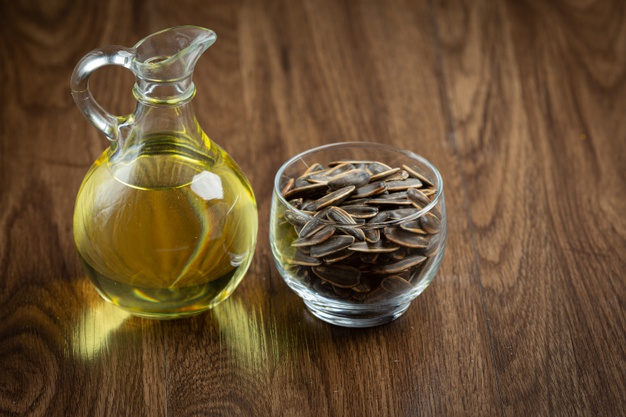
Source:
Danby, S.G., AlEnezi, T., Sultan, A., Lavender, T., Chittock, J., Brown, K. and Cork, M.J., 2013. Effect of olive and sunflower seed oil on the adult skin barrier: implications for neonatal skin care. Pediatric dermatology, 30(1), pp.42-50.
den Hartigh, L.J., 2019. Conjugated linoleic acid effects on cancer, obesity, and atherosclerosis: A review of pre-clinical and human trials with current perspectives. Nutrients, 11(2), p.370.
Franco, R., Iseppi, L. and Taverna, M., 2018. Sunflower oil functional properties for specialty food. Nutrition and Food Science International Journal, 5(4), pp.4-7.
Kanti, V., Günther, M., Stroux, A., Sawatzky, S., Henrich, W., Abou‐Dakn, M., Blume‐Peytavi, U. and Garcia Bartels, N., 2017. Influence of sunflower seed oil or baby lotion on the skin barrier function of newborns: A pilot study. Journal of cosmetic dermatology, 16(4), pp.500-507.
Karagounis, T.K., Gittler, J.K., Rotemberg, V. and Morel, K.D., 2019. Use of “natural” oils for moisturization: review of olive, coconut, and sunflower seed oil. Pediatric dermatology, 36(1), pp.9-15.
Marangoni, F., Agostoni, C., Borghi, C., Catapano, A.L., Cena, H., Ghiselli, A., La Vecchia, C., Lercker, G., Manzato, E., Pirillo, A. and Riccardi, G., 2020. Dietary linoleic acid and human health: Focus on cardiovascular and cardiometabolic effects. Atherosclerosis, 292, pp.90-98.
